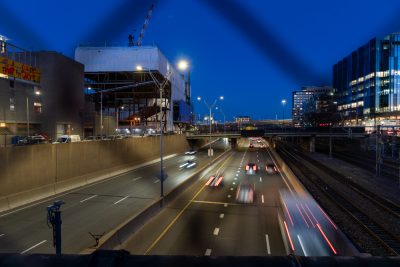
The city of Boston received a $1.8 million grant from the United States Department of Transportation last month which will prepare to put in a green space to connect and improve a divided Chinatown.
In the city’s 2022 grant proposal to the federal Reconnecting Communities pilot program, it wanted to “assess the feasibility of bringing the Chinatown neighborhood back together,” as it has been separated by Interstate 90 since the 1960s.
Zoë Davis, the climate resilience project manager at the City of Boston’s Environmental Department, said the project is meant to address issues like access to green space, air quality and heat risk.
Davis said building a park over the highway will also address the lack of cohesion between the north and south sides of Chinatown.
“It was a sort of intentional separation, where there were hundreds of families that were removed from their homes, so that we could make way for a highway,” Davis said. “We need to focus on building safe spaces and on building resilient spaces as well, and ensuring that a community is connected is a huge part of resilience.”
Franny Xi Wu, the assistant director of Chinatown Community Land Trust, said the concerns from residents over many years have been heard.
“Within the community, residents are very excited about any kind of opportunity that would bring greenery and open space to Chinatown,” Wu said. “Not just to mitigate environmental concerns … but also to mitigate some of those long-standing justice issues that Chinatown residents have been outspoken for.”
Robb Johnson, the executive director of the Massachusetts Land Trust Coalition, said he thinks it’s exciting that this study will benefit low-income communities. Johnson said people in the mid-1900s were mostly concerned with “getting from one place to another” with cars and not of the future impact on pedestrian lives.
“There was certainly less sensitivity to highway construction’s impacts on communities, particularly on communities like Chinatown, than there would be today,” Johnson said.
Johnson said having residents near open spaces can also help improve both mental and physical health.
“Chinatown is quite a dense part of Boston with less open space than many other parts of the city … creating more open space opportunity in that particular part of Boston is, I think, of great value,” he said.
Moira Zellner, professor of public policy and urban affairs at Northeastern University, said there will also be some negative effects from a project of this nature, like eco-gentrification.
“These improvements do increase property values and the way that our tax structures work, [which] essentially leads to a rise in taxes and in rents in these places,” Zellner said. “So people who were long-time residents are suddenly being really pressured to move out.”
Justin Hollander, professor of urban and environmental policy and planning at Tufts University, shared his concern over “green gentrification.”
“Cities look to make these kinds of investments to add more parks and open space,” Hollander said. “And then sometimes the results are that it becomes a more desirable place to live and becomes more expensive.”
After the city of Boston receives the funds, Davis said, the Transportation Department will hire a project manager and start the process in early fall of this year.
“We’ve got to be mindful about how it’s connected spatially, infrastructurally and institutionally to other parts of the community,” Zellner said. “It is a system, so we have to really think of this project as how it articulates with the rest of the system and all these different dimensions.”






















































































































